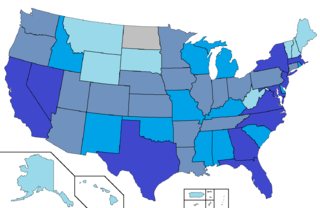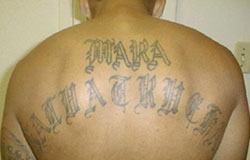
The Canada Border Services Agency is a federal law enforcement agency that is responsible for border guard, immigration enforcement, and customs services in Canada.
Terrorism and mass attacks in Canada includes acts of terrorism, as well as mass shootings, vehicle-ramming attacks, mass stabbings, and other such acts committed in Canada that people may associate with terroristic tactics but have not been classified as terrorism by the Canadian legal system.

The Immigration and Refugee Board of Canada, established in 1989 by an Act of Parliament, is an independent administrative tribunal that is responsible for making decisions on immigration and refugee matters. As one of their responsibilities, the IRB decides on applications for refugee protection made by individuals. The IRB reports to Parliament through the Minister of Immigration, Refugees and Citizenship (IRCC), but remains independent from both the IRCC and the Minister.

In Canada, a security certificate is a legal mechanism by which the Canadian government can detain and deport permanent residents and all other non-citizens living in Canada.

The Immigration and Refugee Protection Act (IRPA) is an Act of the Parliament of Canada, administered by Immigration, Refugees and Citizenship Canada (IRCC) and Canada Border Services Agency (CBSA), that replaced the Immigration Act, 1976 in 2002 as the primary federal legislation regulating immigration to Canada. The "Immigration and Refugee Protection Regulations" (IRPR) specify how provisions of IRPA are to be applied.
The Sanctuary movement was a religious and political campaign in the United States that began in the early 1980s to provide safe haven for Central American refugees fleeing civil conflict. The movement was a response to federal immigration policies that made obtaining asylum difficult for Central Americans.

Mohamed Harkat is a native-born Algerian and permanent resident of Canada who was arrested in 2002 on suspicion of ties to terrorism and was imprisoned under security certificates. The Canadian Security Intelligence Service (CSIS) alleged that he entered the country as a sleeper agent for al-Qaeda.

The Permanent Resident card is an identification document and a travel document for permanent residents of Canada. It is one of the methods by which Canadian permanent residents can prove their status and is, along with the permanent resident travel document (PRTD), one of the only documents that allow permanent residents to return to Canada by a commercial carrier.

The Salvadoran Civil War was a twelve year period of civil war in El Salvador that was fought between the government of El Salvador and the Farabundo Martí National Liberation Front (FMLN), a coalition or "umbrella organization" of left-wing groups backed by the Cuban regime of Fidel Castro as well as the Soviet Union. A coup on 15 October 1979 followed by government killings of anti-coup protesters is widely seen as the start of civil war. The war did not formally end until 16 January 1992 with the signing of the Chapultepec Peace Accords in Mexico City.

According to the 2021 Canadian census, immigrants in Canada number 8.3 million persons and make up approximately 23 percent of Canada's total population. This represents the eighth-largest immigrant population in the world, while the proportion represents one of the highest ratios for industrialized Western countries.

Canadian immigration and refugee law concerns the area of law related to the admission of foreign nationals into Canada, their rights and responsibilities once admitted, and the conditions of their removal. The primary law on these matters is in the Immigration and Refugee Protection Act, whose goals include economic growth, family reunification, and compliance with humanitarian treaties.

Suresh v Canada (Minister of Citizenship and Immigration) is a leading decision of the Supreme Court of Canada in the areas of constitutional law and administrative law. The Court held that, under the Canadian Charter of Rights and Freedoms, in most circumstances the government cannot deport someone to a country where they risk being tortured, but refugee claimants can be deported to their homelands if they are a serious security risk to Canadians.

Salvadoran Americans are Americans of full or partial Salvadoran descent. As of 2021, there are 2,473,947 Salvadoran Americans in the United States, the third-largest Hispanic community by nation of ancestry. According to the Census Bureau, in 2021 Salvadorans made up 4.0% of the total Hispanic population in the United States.

Mara Salvatrucha, commonly known as MS-13, is an international criminal gang that originated in Los Angeles, California, in the 1970s and 1980s. Originally, the gang was set up to protect Salvadoran immigrants from other gangs in the Los Angeles area. Over time, the gang grew into a more traditional criminal organization. MS-13 has a long time rivalry with the 18th Street gang.

U.S. citizens and permanent residents entering Canada by land are required to possess the requisite documentation, such as a passport, driver's license, and other valid identification documents. They must also meet other criteria, such as passing security measures, before they are allowed entry into Canada. Consequently, travelers must also meet the requirements for re-entering the U.S. at the end of their visit.

During the Iraq War, which began with the 2003 invasion of Iraq, there were United States military personnel who refused to participate, or continue to participate, in that specific war. Their refusal meant that they faced the possibility of punishment in the United States according to Article 85 of the US Uniform Code of Military Justice. For that reason some of them chose to go to Canada as a place of refuge. The choice of these US Iraq War resisters to go to Canada has led to considerable debate in Canada's society, press, legal arenas, and political arenas. Much of the debate on this issue has been due to the controversial nature of the Iraq War itself. Among the many elements of that debate are Canada's relationship to the Iraq War, and Canada's relationship to the US, its largest trading partner.

During the Salvadoran Civil War, on 16 November 1989, Salvadoran Army soldiers killed six Jesuits and two others, the caretaker's wife and daughter, at their residence on the campus of Central American University in San Salvador, El Salvador. Polaroids of the Jesuits' bullet-riddled bodies were on display in the hallway outside the Chapel.

Illegal immigration to Canada is the act of a person who is not a Canadian citizen or permanent resident entering or remaining in Canada in a manner contrary to the Immigration and Refugee Protection Act and its associated regulations. That includes persons who entered Canada on a travel visa but remained beyond the period of stay specified as well as persons who entered Canada without presenting themselves at a port of entry.

Salvadorans are the second largest Hispanic group in the United States and the second largest foreign born group in Los Angeles. The main wave of immigrants came during the Salvadoran Civil War in the 1980s, in order to escape the violence and political and economic instability in the country. Since then, Salvadorans have continued to migrate to Los Angeles as well as other cities around the United States. The community is well established in Los Angeles and stands as an integral part of its cultural and economic life.
Carmelo Bruzzese, is an Italian-Canadian from Grotteria, Calabria, who was connected to the 'Ndrangheta and the Siderno Group branch based in Woodbridge, Ontario.











